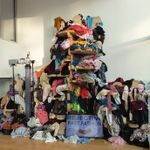Date: Thursday, October 6
Time: 1:00 – 2:30 PM EST
Location: Crosstown 305
This panel discussion will bring together researchers, practitioners, and artists with expertise in understanding the impacts that environmental racism has on health, as well as how public health research can be used to inform artistic expression and how the experience of art can influence social change to create healthier communities.
The Issue: Since 1960, the amount of post-consumer textile waste (PCTW) generated each year in the United States has increased nearly ten-fold to exceed more than 34 billion pounds in 2018 (U.S. EPA, 2017). This represents a significant portion of the more than 184 billion pounds of textile waste produced every year globally (Global Fashion Agenda and Boston Consulting Group, 2017). Of the PCTW generated in the United States, 66% was sent to landfills, 19% was combusted with energy recovery, and only 15% was recycled (U.S. EPA, 2017). The accumulation of PCTW in landfills and open-air dumps represents a serious public health and environmental problem that has impacts on biodiversity, water pollution, and greenhouse gas emissions (Bick et al., 2018).
The waste is often shipped to East and West African countries, many of which have attempted to ban second-hand clothing imports. Communities in these areas often have less advanced municipal waste systems, meaning that pollutants from decomposing textiles will more easily enter the environment and potentially affect groundwater and human health.
An opportunity: The arts have been shown to influence six broad areas of individual and population-level health and are widely utilized as a means for health education and wellness promotion in communities, but their applications are inconsistently recognized in the public health sector.
The Panel
Dr. Julia DeVoy
Julia Devoy’s research and teaching are concentrated on the relationship of social class variables to the human lifespan, with a focus on social mobility among low-income global citizens that examines personal aspects, as well as ecological contexts such as family, faith, workplace, community and educational settings, which facilitate or constrain development. She is currently investigating ways in which economically disempowered individuals develop dual class-based psychological identities in order to transition to elevated economic levels while maintaining healthy emotional well-being and relational support. In the field, she advises on the design of social impact initiatives as interventions for helping address systemic social inequities.
Mark Cooper
Mark Cooper is the creator of “Aftermath” (2021), which features a landfill reactor simulator and a display of second-hand garments to underscore the waste generated from a culture of overconsumption, in the Talbot Lobby. Please take some time to experience the sculpture. He also serves as the Director of Undergraduate Studies, Studio Art for the Morrissey College of Arts and Sciences at Boston College. In 1994, Professor Cooper was invited by the Capitol Children’s Museum to work with adolescents from the Youth at Risk Program, the National Learning Center, Neighborhood Schools, Police Boys and Girls Clubs, and Homeless Shelters. The project was to create 1,110 works of public art expressing the wish to Stop the Violence. He collaborates with the young people to create billboards and illuminated dioramas which are attached to public buses and displayed in the Washington, D.C. metro system.
Sunand Bhattacharya
Sunand Bhattacharya is the Associate Vice Provost for Design and Innovation Strategies for the School of Social Work at Boston College. He is a learning architect and an industrial designer who has been spearheading the design and development of BC’s first human-centered engineering program. He is also helping build a culture of collaborative innovation across BC using design-driven methodologies to address real-world challenges. Before returning to academia, Sunand was the Global Learning Strategist for Autodesk, leading its Learning Futures team. In this role, he was responsible for the strategy, management and evangelization of Autodesk’s future influence advocacy in design-related STEAM and engineering education. Before Autodesk, Sunand was the principal and co-founding partner of Arjuna Learning Designs LLC., a firm specializing in creating interactive learning objects to enhance the quality of teaching and learning for leading publishing houses. He was a tenured professor of industrial design at Southern Illinois University at Carbondale. Sunand is a recipient of the ‘Innovative Excellence in Teaching, Learning, and Technology’ award from The International Conference on College Teaching and Learning.
Dr. Philip J. Landrigan
Phil Landgrigan is a pediatrician, public health physician, and epidemiologist. He serves as the Director of the Global Public Health Program and the Global Observatory on Planetary Health at the Schiller Institute for Integrated Science and Society. His research uses the tools of epidemiology to elucidate connections between toxic chemicals and human health, especially the health of infants and children with a particular interest in understanding how toxic chemicals injure the developing brains and nervous systems of children and in translating this knowledge into public policy to protect health.
Moderator: Dr. Jennifer Beard
Jen Beard is a Clinical Associate Professor in the Department of Global Health at Boston University School of Public Health, the Associate Editor of Public Health Post, and an Assistant Director for Narrative in the Center for Antiracist Research. Dr. Beard’s scholarship explores the intersection between population health, the arts and humanities, and journalism; and the health and well-being of key populations at high risk for HIV and trauma including sex workers, drug users, orphans, and other highly vulnerable children. From 2010-2014, she was the principal investigator for the multi-study Ghana Operations Research for Key Populations project. The 9 qualitative studies (done in collaboration with the Kwame Nkrumah University of Science and Technology, the Ghana AIDS Commission, and USAID) identified the HIV prevention and harm reduction needs of young female sex workers and their boyfriends, prisoners, men who have sex with men, post-secondary female students, women who work in bars, people who inject drugs, and people living with HIV at risk of dropping out of antiretroviral therapy. She has also worked in India, Kenya, South Africa, Tanzania, Ukraine, and Zambia.

